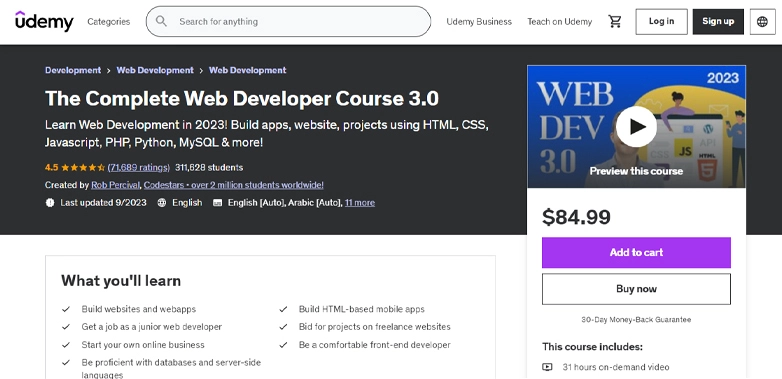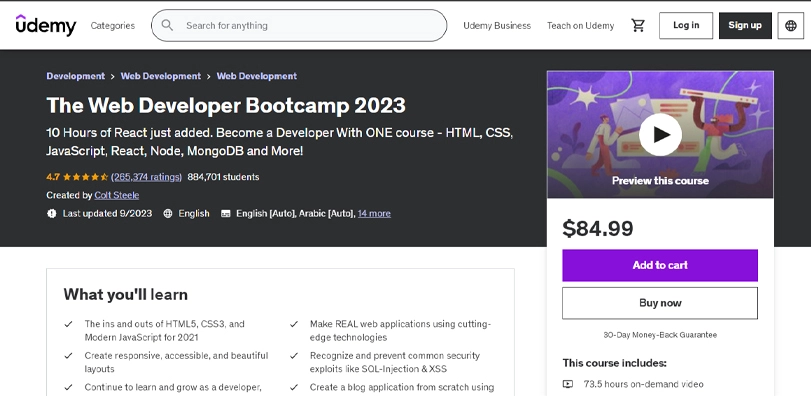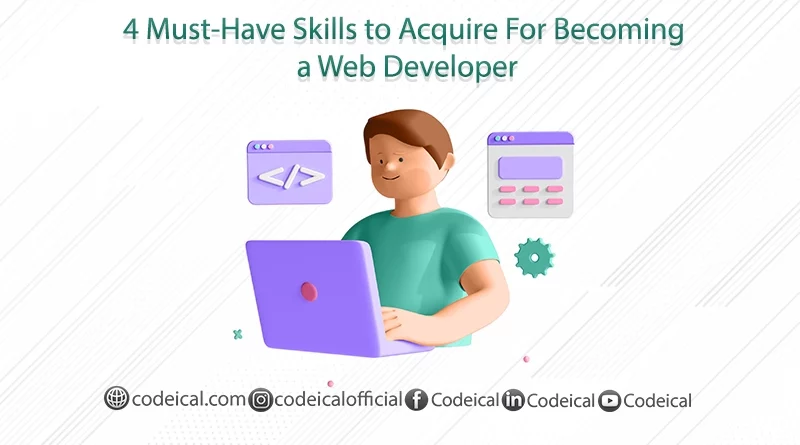For Becoming a Web Developer : 4 Must-Have Skills to Acquire
If you aspire to become a Web Developer through coding, you might be grappling with the overwhelming array of tools and languages you need to master. I can empathize because I too felt that way when embarking on my initial web development courses. Which programming language should you focus on? When will you be prepared to start earning through coding?
Here’s the reality: Achieving the status of a Web Developer requires an extensive commitment. You must dedicate countless hours to learning and honing your skills.
However, there are a few tactics you can employ to expedite your acquisition of the necessary skills beyond your expectations.
So, if you occasionally find yourself confused and uncertain about the steps to take on the path to becoming a Web Developer, this article is tailored to your needs.
I will impart the most invaluable insights I’ve gained from my journey as a full-time freelance Web Developer. Additionally, I will reveal the resources and online courses I leveraged to kickstart my career in web development.
Keep reading!
Table of Contents
ToggleWhen do I become a web developer?
What exactly does it mean to “embark on the journey of becoming a web developer”?
Once you’ve acquired the essential skills and are ready to start seeking job opportunities, you can rightfully consider yourself a developer.
Depending on your pace of learning, this journey might span anywhere from 6 to 12 months. It’s generally wiser to take your time and avoid rushing through it.
Coding and web development encompass intricate domains filled with a multitude of terminology and technical jargon to grasp.
While you don’t necessarily need to master every programming language in existence, it’s crucial to have a basic understanding of their purposes.
Even though becoming a web developer requires substantial effort, remember that you’re advancing with each session of learning.
Once you have the ability to engage in real-world projects and use code to craft something from scratch, you can consider yourself a developer.
Simply put, once you can generate an HTML heading and a paragraph, you’ve already surpassed the web development knowledge of 90% of individuals. Achieving this proficiency typically takes just about 5 minutes and marks the starting point for every aspiring web developer. Taking that initial step makes subsequent ones considerably more accessible. Now, let’s explore the essential prerequisites for embarking on a journey to become a web developer.
Minimum skills: Junior Front-End Developer
What are the fundamental requirements and skills you need to kickstart your initial job search?
If you’re aspiring to secure a position as a Junior Front-End Developer, acquaint yourself with these four tools. Initially, it might seem overwhelming due to the acronyms and technical jargon.
HTML, short for HyperText Markup Language, is responsible for constructing a website’s structure and content. It allows you to create headings, paragraphs, links, images, lists, and more.
CSS, or Cascading Style Sheets, is utilized to enhance the visual appeal of your HTML content. It dictates the aesthetics and layout of a website, encompassing aspects like colors, typography, sizes, positioning, alignment, and basic animations.
JavaScript brings vitality to your HTML and CSS-driven website, adding interactivity and engagement. You can make elements appear or vanish when users click buttons and alter their attributes like size, color, and more based on user interactions.
jQuery is a JavaScript library that simplifies and expedites JavaScript usage.
It may seem like a lot to grasp initially.
Is it really necessary to learn four different languages and tools for an entry-level position?
Absolutely. Nevertheless, it’s possible to start applying for jobs with just HTML and CSS. However, incorporating JavaScript will significantly enhance your projects and daily tasks, making them more engaging and captivating.
Rest assured that you can grasp the fundamentals of all these concepts within a few days or weeks.
What may require a more significant time investment is comprehending how to seamlessly assemble the elements to construct a functional website from the ground up.
Where can I learn HTML, CSS, and JavaScript?
Here’s some great news: the accessibility of learning coding and web development online today is unparalleled.
The internet offers a plethora of courses, to the point that beginners often struggle to identify the most suitable coding courses to embark on.
That’s where I come in. I’ve personally completed several web development courses online, and I’m more than willing to share my experiences to assist you in getting started.
What truly sets a top-notch online course for web development apart is the presence of numerous projects and assignments. They provide a platform for you to put your newly acquired skills into practice by crafting something from scratch.
Believe me, there’s no better way to learn and truly comprehend the subject matter than by immediately applying your skills.
Recommended Beginner-Level Web Development Courses
If you’re brand new to coding and web development, I suggest beginning your journey with my Free Coding Guide for Beginners, where you can start with the fundamental concepts.
Following this, it’s time to seek out an appropriate online course for furthering your learning. To assist you in discovering a course that suits your needs, I’ve compiled a list of the finest online web development courses for your consideration.
I would suggest commencing your journey by acquiring the fundamentals of HTML and CSS through Codecademy. Their introductory courses and tutorials serve as an excellent launching point.
I consistently recommend starting with a beginner-level course that encompasses a variety of popular web development tools and programming languages. When you’re just embarking on your coding journey, it can be challenging to ascertain your future coding aspirations. By familiarizing yourself with the basics of multiple tools simultaneously, you’ll be better equipped to identify your preferences.
While I typically don’t play favorites when it comes to online courses, there are occasions when exceptions are made. That’s why I’ve singled out the following three beginner-level courses, based on my most positive experiences with them.
These are courses I personally completed, and they significantly accelerated the growth of my web development business, surpassing my initial expectations. Beginning with no prior experience, I ventured into freelancing within just 5 months, and within 11 months, I transitioned into a full-time entrepreneurial role. It’s worth noting that each course proved to be an even more worthwhile investment than I had anticipated!
The Complete Web Developer Course 3.0 (Udemy)

If you are only going to take one course in web development, I’d definitely recommend going with The Complete Web Developer Course 3.0 at Udemy.
You’ll acquire a comprehensive set of skills essential for a Junior Front-End Developer position and beyond through this course.
Think of this course as a comprehensive bundle designed to teach you the fundamentals of the most prevalent and crucial web development languages and tools.
In addition to HTML, CSS, JavaScript, and jQuery, you’ll delve into numerous other tools that might prove invaluable down the road, even including back-end development languages. Pretty impressive, isn’t it?
The Web Developer Bootcamp (Udemy)

The Web Developer Bootcamp on Udemy is among my top-rated courses. It’s an exceptionally thorough introductory web development program that I’d suggest to anyone keen on grasping the fundamentals of web development and beyond. Loaded with valuable content and an array of engaging projects to tackle, this course provides everything necessary to acquire the skills for crafting stunning, contemporary websites.
Front End Development Track (Treehouse)
Team Treehouse is an online learning platform that operates on a subscription model, focusing on programming and web development education. To experience their approach, you can utilize this link to access a complimentary 7-day trial, granting you full access to their extensive range of courses and content.
The Front End Development Track on Treehouse is a curated selection of courses designed to equip you with the essential knowledge of HTML, CSS, JavaScript, and jQuery, enabling you to embark on your own projects.
Personally, I hold a strong admiration for Treehouse. Their coding courses maintain a high standard, catering to individuals regardless of their current skill level. Even if you are a complete novice, the instructors will guide you attentively, ensuring your comprehension and progress.
Your first web development project: Your own portfolio website
To kickstart your journey in web development, your very first undertaking should be the creation of a portfolio website that showcases your skills. A portfolio website serves three primary functions:
- It serves as an introduction to your online presence.
- It provides visitors with an overview of your skillset.
- It showcases the projects you’ve been involved in.
Undoubtedly, when you’re just beginning in coding and web development, you might not have a substantial number of projects to feature. Nevertheless, crafting a modern and appealing portfolio website is akin to having an online resume that is accessible to anyone.
As you accumulate more experience, you can readily augment your portfolio with new projects for everyone to peruse.
Now, how can you go about creating a portfolio as a web developer? You have two main options:
- Build it from scratch, coding every element yourself.
- Utilize a Content Management System (CMS) such as WordPress.
The choice is entirely yours. However, don’t hesitate to consider WordPress as a means to expedite the creation of your portfolio website.
In fact, this is precisely what I did, and it resulted in an influx of new WordPress projects from entirely new clients. This encouraged me to specialize in the development of WordPress websites exclusively.
When can I start applying for my first developer job?
Acquiring technical skills can expedite your income generation through coding more rapidly than you may anticipate.
Yet, how can you determine your readiness to seek job opportunities?
How can you discern when prospective employers will express interest in your abilities?
In general, the demand for developers in the job market is thriving worldwide. Tech skills are in such high demand that you should commence your job hunt as soon as you feel sufficiently confident, perhaps even a bit earlier.
I’ve compiled three straightforward suggestions to consider when you believe you’re prepared to draft your initial job application:
Tip 1: Recognize the Value of Your Self-Taught Web Development Skills
When you’re self-teaching web development, it’s common to underestimate your worth in the job market. This occurs because you don’t receive any formal recognition for your progress; there are no grades or evaluations as in a school setting.
So, how can you assess your level of competency?
The key is to step back and objectively evaluate what you’ve achieved thus far. Recognize your strengths and areas where you may need more practice. Take pride in your learning journey, acknowledge your potential, and embrace the confidence to further enhance your skills.
Consider the fact that if you’ve built a fully functional website from scratch, you’re already quite accomplished. Not everyone can do that. In fact, I’ve heard of self-taught developers landing junior roles within 3-6 months, depending on their location.
Tip 2: Don’t Be Deterred by Unmatched Skills in Job Listings
Today, job advertisements often include extensive lists of required skills, which can be disheartening. However, don’t let this discourage you. If an employer is seeking someone proficient in the core tools you know, don’t hesitate to apply.
Even if the list of required skills is lengthy, submit a strong application and see how it goes. It’s always a good idea to inform the employer that you’re actively enhancing your technical skills. If you’re learning additional programming languages and tools, be sure to mention them in your application.
Tip 3: Job Rejections Don’t Invalidate Your Efforts
If you don’t secure a job, don’t let it diminish your spirits. Every company that reviews your application or invites you for an interview forms an initial impression of you. You’ve introduced yourself, and they know you’re interested in working with them.
There’s a chance that they may have another suitable position opening up in the future, and you could be the perfect fit for it.
Final thoughts: How to become a web developer
In summary, becoming a web developer is now more accessible than ever. Numerous valuable online resources are available for anyone looking to acquire the essential skills for an entry-level junior position.
Nonetheless, acquiring these skills resembles the process of learning anything entirely new. In other words, you can expect challenges along the way. However, the overall journey can be incredibly fulfilling, regardless of your motivations and objectives.
Therefore, when considering how to embark on a web development career, the most critical factors are:
- Having the ability to locate answers when needed.
- Applying your skills to create projects for your portfolio.
It’s as straightforward as that. These two aspects will take you a long way, I assure you.
If you found this article about becoming a web developer interesting, we’d love to hear your thoughts in the comments section below!
Additionally, if you found this post to be useful, please consider sharing it with others so they can benefit from it as well. Thank you for your support!
Until next time, happy coding!
-Codeical!


